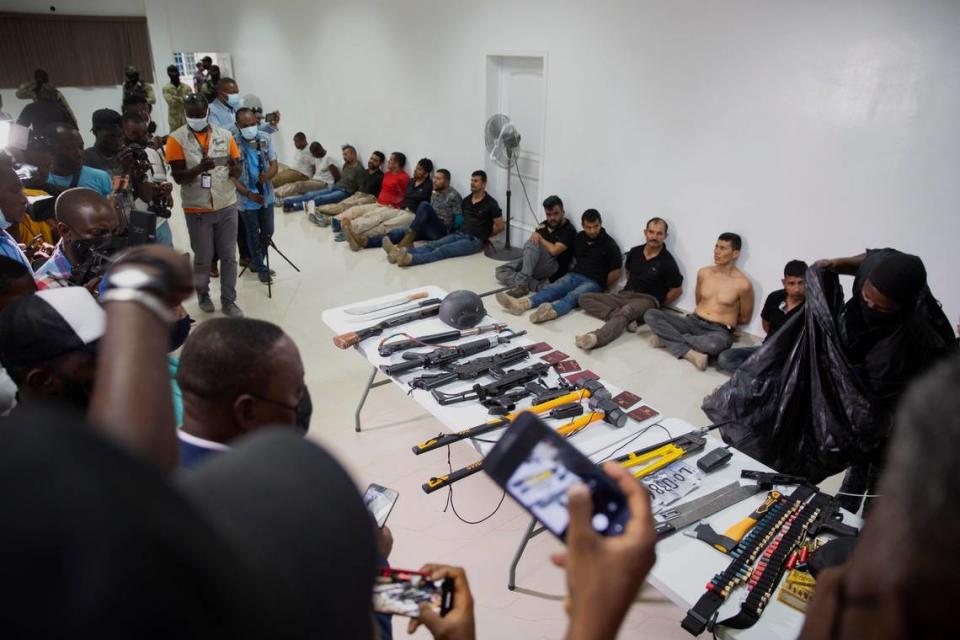Floridians held in Haiti assassination say they did not know plot had morphed into a murder
- Oops!Something went wrong.Please try again later.
Two of the Florida men who were charged this week in connection with the assassination of Haitian President Jovenel Moïse will be spending more time behind bars after a federal magistrate judge decided she didn’t feel it was safe to let them loose on bond,
A third man will be going home, however, but at a steep price. The fourth was given a delay.
Fredrick Bergmann Jr., charged with smuggling ballistic vests to former Colombian soldiers who allegedly carried out the deadly July 7, 2021, attack that left Moïse dead and his wife, Martine Moïse, seriously wounded, was granted a $1.5 million surety bond and released Friday afternoon.
In prior Herald reporting that cited Floridians with possible connections to the assassination plot, Bergmann’s name never came up. But during cross examination of FBI agent Michael Ferlazzo by Bergmann’s lawyer, it was revealed that Walter Veintemilla and Árcangel Pretel Ortiz, two of the others arrested Tuesday, told the FBI that Bergmann participated in meetings where plans to unseat Moïse were discussed.
Antonio “Tony” Intriago, owner of Doral-based Counter Terrorist Unit Security, or CTU, which was an affiliate of Ortiz’s CTU Federal Academy LLC, was accused by the government of being one of the two “planners and organizers” of the plot. He entered a plea of not guilty and his lawyer asked for his bond hearing to be postponed for a later date.
Veintemilla, head of Miramar-based Worldwide Capital Lending Group, the company that provided funds to carry out the plot, according to prosecutors, and Ortiz were both denied bond.

While delivering her decisions, Magistrate Judge Lauren Louis said there were “no conditions” that she could add to a bond for either Veintemilla or Ortiz that would “reasonably assure” the safety of the community — or that they would not leave the United States.
Louis said she expected Julie Holt, assistant public defender representing Ortiz, and Tara Kudman, attorney for Veintemilla, to appeal the denials.
Ortiz, who met with FBI agents in an attempt to involve the agency in the plot, according to the criminal complaint released Tuesday, was not arraigned because he does not yet have a permanent lawyer. There were yet-to-be-resolved objections from the government about a potential conflict of interest regarding Ortiz’s representation by the Public Defender’s Office.
During the cross examination of FBI agent Ferlazzo by Bergmann’s attorney, Henry Bell, events that unfolded during Bergmann’s arrest were also cleared up.
During Tuesday’s appearance, federal prosecutor Monica Castro stated that Bergmann was holding a curtain rod when police entered his home to arrest him in Tampa. But Ferlazzo testified that Bergmann was carrying a “wooden dowel” that Bell later said was used to secure the door. Bell later introduced photo evidence from Bergmann’s wife of the object in question.
Ferlazzo also testified that Bergmann appeared confused but did not resist arrest or pose a threat to agents, though Castro had said previously that arresting officers reported him as being “agitated.” Bergmann put down the dowel when he was instructed to do so, Ferlazzo said.
During his cross examination, Ferlazzo testified that there were two phases of the plot. The first was allegedly to unseat President Moïse and install as president Christian Emmanuel Sanon, a Haitian-American pastor and physician who is currently in custody in the United States after he was transferred from a Haitian prison at the end of January. Phase two allegedly involved replacing Sanon with a new candidate, a Supreme Court justice identified only as “individual two.”
All three lawyers for the defendants argued that their clients were not aware that the plan was to kill Moïse, and had only agreed to participate in the first phase of the plan, which was to make Sanon president. Ferlazzo testified that both phases had “themes of assassination.”
Veintemilla and Ortiz’s lawyers also argued that they were not flight risks because they had cooperated with investigators for the past 18 months and had not tried to flee or evade arrests during that time.
Bergmann’s bond, agreed to by both Bell and U.S. prosecutors, is secured by three properties owned by Bergmann and his wife, Dr. Tracy Martin, who works as a pediatrician in Tampa. One of the properties is his home where he lives with his wife and daughter. The second is where Bergmann’s parents live but the couple owns, and a third property his wife owns on her own, which predates their marriage. Martin also agreed to be Bergmann’s third-party custodian.
Bergmann will be on house arrest with a GPS monitor but is expected to be allowed to visit his parents’ home as he is their caretaker.

